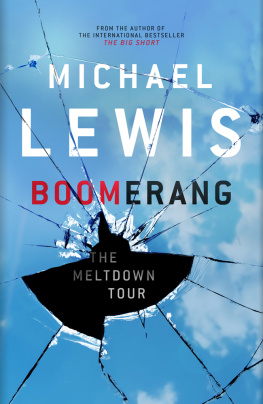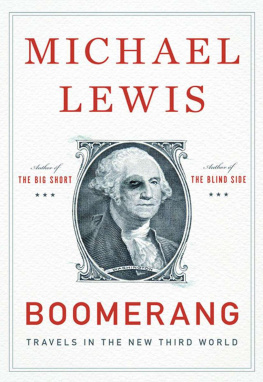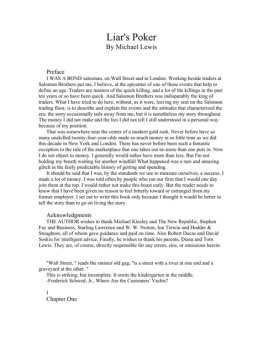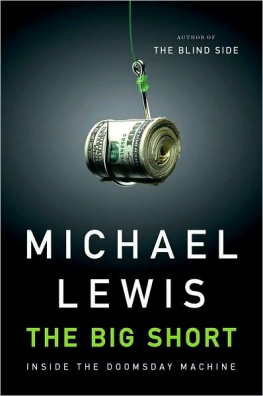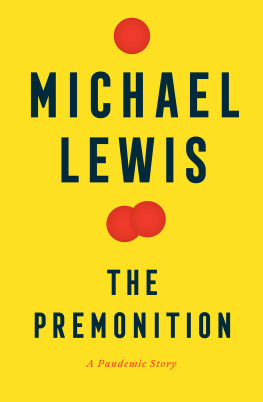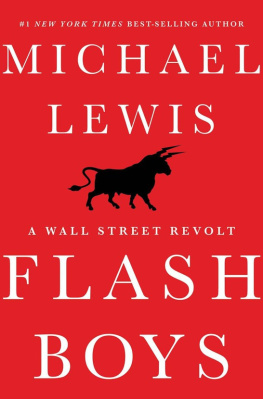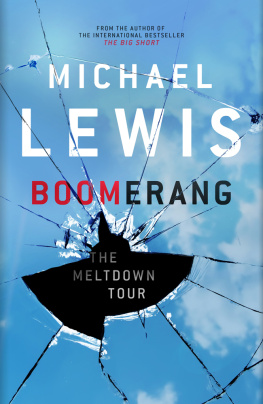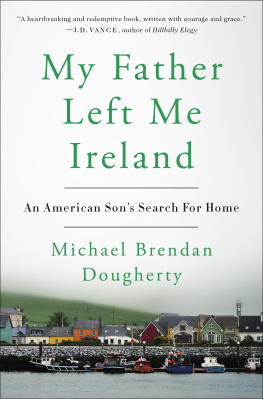
MICHAEL LEWIS
Boomerang
The Meltdown Tour

ALLEN LANE
an imprint of
PENGUIN BOOKS
ALLEN LANE
Published by the Penguin Group
Penguin Books Ltd, 80 Strand, London WC2R 0RL , England
Penguin Group (USA) Inc., 375 Hudson Street, New York, New York 10014, USA
Penguin Group (Canada), 90 Eglinton Avenue East, Suite 700, Toronto, Ontario, Canada M4P 2Y3
(a division of Pearson Penguin Canada Inc.)
Penguin Ireland, 25 St Stephens Green, Dublin 2, Ireland (a division of Penguin Books Ltd)
Penguin Group (Australia), 250 Camberwell Road, Camberwell, Victoria 3124, Australia
(a division of Pearson Australia Group Pty Ltd)
Penguin Books India Pvt Ltd, 11 Community Centre, Panchsheel Park, New Delhi 110 017, India
Penguin Group (NZ), 67 Apollo Drive, Rosedale, Auckland 0632, New Zealand
(a division of Pearson New Zealand Ltd)
Penguin Books (South Africa) (Pty) Ltd, 24 Sturdee Avenue, Rosebank, Johannesburg 2196, South Africa
Penguin Books Ltd, Registered Offices: 80 Strand, London WC2R 0RL , England
www.penguin.com
First published in the United States of America by W. W. Norton & Company, Inc. 2011
First published in Great Britain by Allen Lane 2011
Copyright Michael Lewis, 2011
Grateful acknowledgment is made to Vanity Fair, where the pieces in this book appeared in slightly different form:
Wall Street on the Tundra, April 2009; Beware of Greeks Bearing Bonds, October 2010; When Irish Eyes Are Crying, March 2011; Its the Economy, Dummkopf!, September 2011; Too Fat to Fly, November 2011.
The moral right of the author has been asserted
Cover design by Keenan
All rights reserved
Without limiting the rights under copyright reserved above, no part of this publication may be reproduced, stored in or introduced into a retrieval system, or transmitted, in any form or by any means (electronic, mechanical, photocopying, recording or otherwise), without the prior written permission of both the copyright owner and the above publisher of this book
ISBN: 9780141970479
ALSO BY MICHAEL LEWIS
The Big Short
Home Game
Liars Poker
The Money Culture
Pacific Rift
Losers
The New New Thing
Next
Moneyball
Coach
The Blind Side
EDITED BY MICHAEL LEWIS
Panic
To Doug Stumpf, gifted editor and gentle soul, without whom it never would have occurred to me to tour the ruins
Preface
The Biggest Short
This book began accidentally, while I was at work on another book, about Wall Street and the 2008 U.S. financial disaster. Id become interested in a tiny handful of investors who had made their fortunes from the collapse of the subprime mortgage market. Back in 2004, the biggest Wall Street investment banks had created the instrument of their own destruction, the credit default swap on the subprime mortgage bond. The credit default swap enabled investors to bet against the price of any given bondto short it. It was an insurance policy, but with a twist: the buyer didnt need to own the insured asset. No insurance company can legally sell you fire protection on another persons house, but the financial markets can and will sell you default insurance on another persons investments. Hundreds of investors had dabbled in the credit default swap marketa lot of people had thought, at least in passing, that the debt-fueled U.S. housing boom was unsustainablebut only fifteen or so had gone all in, and placed enormous bets that vast tracts of American finance would go up in flames. Most of these people ran hedge funds in London or New York; most, usually, avoided journalists. But on this topic, at this moment, they were surprisingly open. All had experienced the strange and isolating sensation of being the sane man in an insane world and, when they talked about their experience, sounded as a person might if he had sat alone and in silence in a small boat and watched the Titanic steam into the iceberg.
A few of these people were temperamentally ill-suited to solitude and silence. Among this subset was the manager of a hedge fund called Hayman Capital, in Dallas, Texas. His name was Kyle Bass. Bass was a native Texan in his late thirties who had spent the first years of his career, seven of them at Bear Stearns, selling bonds for Wall Street firms. In late 2006 hed taken half of the $10 million he had saved from his Wall Street career, raised another $500 million from other people, created his hedge fund, and made a massive wager against the subprime mortgage bond market. Then hed flown to New York to warn his old friends that they were on the wrong side of a lot of stupid bets. The traders at Bear Stearns had no interest in what he had to say. You worry about your risk management. Ill worry about ours, one of them had told him. By the end of 2008, when I went to Dallas to see Bass, the subprime mortgage bond market had collapsed, taking Bear Stearns with it. He was now rich and even, in investment circles, a little famous. But his mind had moved on from the subprime mortgage bond debacle: having taken his profits, he had a new all-consuming interest, governments. The United States government was just then busy taking on to its own books the subprime loans made by Bear Stearns and other Wall Street banks. The Federal Reserve would wind up absorbing the risk, in one form or another, associated with nearly $2 trillion in dodgy securities. Its actions were of a piece with those of other governments in the rich, developed world: the bad loans made by highly paid financiers working in the private sector were being eaten by national treasuries and central banks everywhere.
In Kyle Basss opinion, the financial crisis wasnt over. It was simply being smothered by the full faith and credit of rich Western governments. I spent a day listening to him and his colleagues discuss, almost giddily, where this might lead. They were no longer talking about the collapse of a few bonds. They were talking about the collapse of entire countries.
And they had a shiny new investment thesis. It ran, roughly, as follows. From 2002 there had been something like a false boom in much of the rich, developed world. What appeared to be economic growth was activity fueled by people borrowing money they probably couldnt afford to repay: by their rough count, worldwide debts, public and private, had more than doubled since 2002, from $84 trillion to $195 trillion. Weve never had this kind of accumulation of debt in world history, said Bass. Critically, the big banks that had extended much of this credit were no longer treated as private enterprises but as extensions of their local governments, sure to be bailed out in a crisis. The public debt of rich countries already stood at what appeared to be dangerously high levels and, in response to the crisis, was rapidly growing. But the public debt of these countries was no longer the official public debt. As a practical matter it included the debts inside each countrys banking system, which, in another crisis, would be transferred to the government. The first thing we tried to figure out, said Bass, was how big these banking systems were, especially in relation to government revenues. We took about four months to gather the data. No one had it.
The numbers added up to astonishing totals: Ireland, for instance, with its large and growing annual deficits, had amassed debts of more than twenty-five times its annual tax revenues. Spain and France had accumulated debts of more than ten times their annual revenues. Historically, such levels of government indebtedness had led to government default. Heres the only way I think things can work out for these countries, Bass said. If they start running real budget surpluses. Yeah, and that will happen right after
Next page
